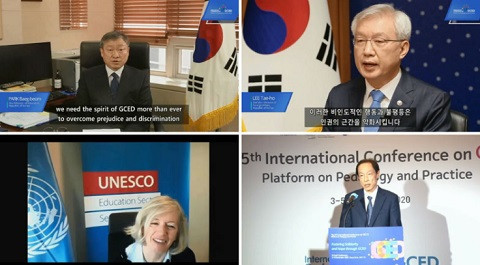
GCED Basic Search Form
Quick Search
Вы здесь
Новости

The 5th International Conference on GCED (IConGCED) was held online from 3 to 5 November 2020. This Conference was co-organized by the Asia-Pacific Centre of Education for International Understanding (APCEIU), the Ministry of Education, and the Ministry of Foreign Affairs of the Republic of Korea, and in partnership with UNESCO,
Under the overarching theme of “Fostering Solidarity and Hope through GCED,” the Conference provided a venue for dialogues to examine the role of GCED in response to the pandemic and revitalise global solidarity.
Over 1,300 education policy makers, educators, stakeholders from academia, international organisation and civil society organisation, and youth members from 111 countries attended the conference virtually. Distinguished guests among the participants includes the Vice Minister of Education of the Republic of Korea, PARK Baeg-beom, the 2nd Vice Minister of the Foreign Affairs of the Republic of Korea, LEE Tae-ho, and the Assistant Director-General for Education of UNESCO, Stefania GIANNINI.
Professor Lynn DAVIES from the University of Birmingham stressed that “we must understand the process of how injustices occur and consider strategies to prevent the repetition of injustices” in her keynote speech on global solidarity against all forms of systematic discrimination, exclusion and phobia. Professor CHOE Jae from Ewha Womans University addressed the lessons we should learn from the pandemic and endeavours to create a better future in his keynote speech. He asserted that “while the pandemic may not destroy our human race, climate change can do,” as he emphasized the urgency of “ecological turn,” cognitive shift towards ecological thinking.
During the first panel discussion, a wide range of experts from the fields of peace and conflict resolution, media & information literacy (MIL), teacher association, and environment explored the primary issues raised by the recent pandemic from the GCED perspective. The panelists addressed several problems resulting from the inaccessibility of education, one of many unforeseen side effects of the pandemic. Consequently distance learning is in demand, but teachers are also facing limitation in their delivery of pedagogies and developing educational contents beyond the basic introductory level course. As such, while the online platform has opened a new window of opportunities for learning, the experts anticipated that we must also prepare ourselves for the dangers posed by unchecked digital space.
On the following day, educators from South Korea and South Africa were invited to share their local practices of facilitating education for anti-discrimination and social justice. In the first special talk titled “Transforming a crisis into an educational opportunity: Critical reflection on discrimination and inequality in our own society,” the Korean educators discussed how they fostered a learning environment where students may inquire and discuss social injustice and inequality issues by observing the impact of the pandemic in their daily lives. Meanwhile, in another special talk titled “No story left behind - Storytelling and social justice,” South African educators shared a compelling case of imbuing a message of social transformation to the younger generation and contextualizing seemingly abstract notions of social justice based on individual stories of racism and social inequality.
In Session 3 titled “Transformative Engagement and Education for Sustainable Development,” panelists discussed a diverse range of educational practices in Central America, Africa, and the Middle East. While emphasizing that local effort for sustainable development can stir a global momentum for change, the experts shared their transformative experiences of implementing school rules for living together with students to apply their commitment to action. In one instance, an educator from UNESCO ASPnet in Lebanon shared his experience of motivating students to add environmentally conscious features to the building (e.g. roof to collect rainwater) to foster the physical transformation of school space towards sustainability. He stressed that it is important to inspire students to take interest in sustainable development by changing their school environment.
Meanwhile, the experts also examined key emerging concepts of digital citizenship and its relevance to GCED. During the session, a mini workshop was also facilitated for the participants to get a first-hand experience of critical media & information literacy amidst the overwhelming tide of fake news.
The last day of the Conference comprised of a variety of activities through a virtual expo session where various GCED related studies, publications, projects were introduced. This special session included promotional video clips to introduce “Emerging Issues in Times of the Multiple Pandemics: The Korean Experience” published by APCEIU, “NISSEM Global Briefs 2020,” and so on.
In the closing session, under the title of “Next Normal” we make”, representatives from UNESCO HQ, UNESCO Group of Friends for Solidarity and Inclusion with GCED, Kenya Ministry of Education, Department of Education and Training of Victoria State in Australia, academia, and youth were invited as panelists to discuss the vision of GCED for this pandemic era and beyond. In particular, Ambassador H.E. Tamara SIAMASHVILI of Permanent Delegation of the Republic of Serbia to UNESCO noted that “experts and practitioners should raise public awareness of GCED and strengthen advocacy through collaboration.” The moderator, Director LIM Hyun Mook from APCEIU, concurred that the role of GCED in times of pandemic is critical more than ever and concluded on a positive note that “there is still a lot we can do to actualize the full potential of GCED into reality.”
Despite the limitations posed by the pandemic, the Conference was able to draw a great degree of attention from the participants around the world. By hosting a virtual conference, the 5th IConGCED contributed to creating a new platform to revisit the role of GCED and revive global solidarity in this pandemic era.
URL:
